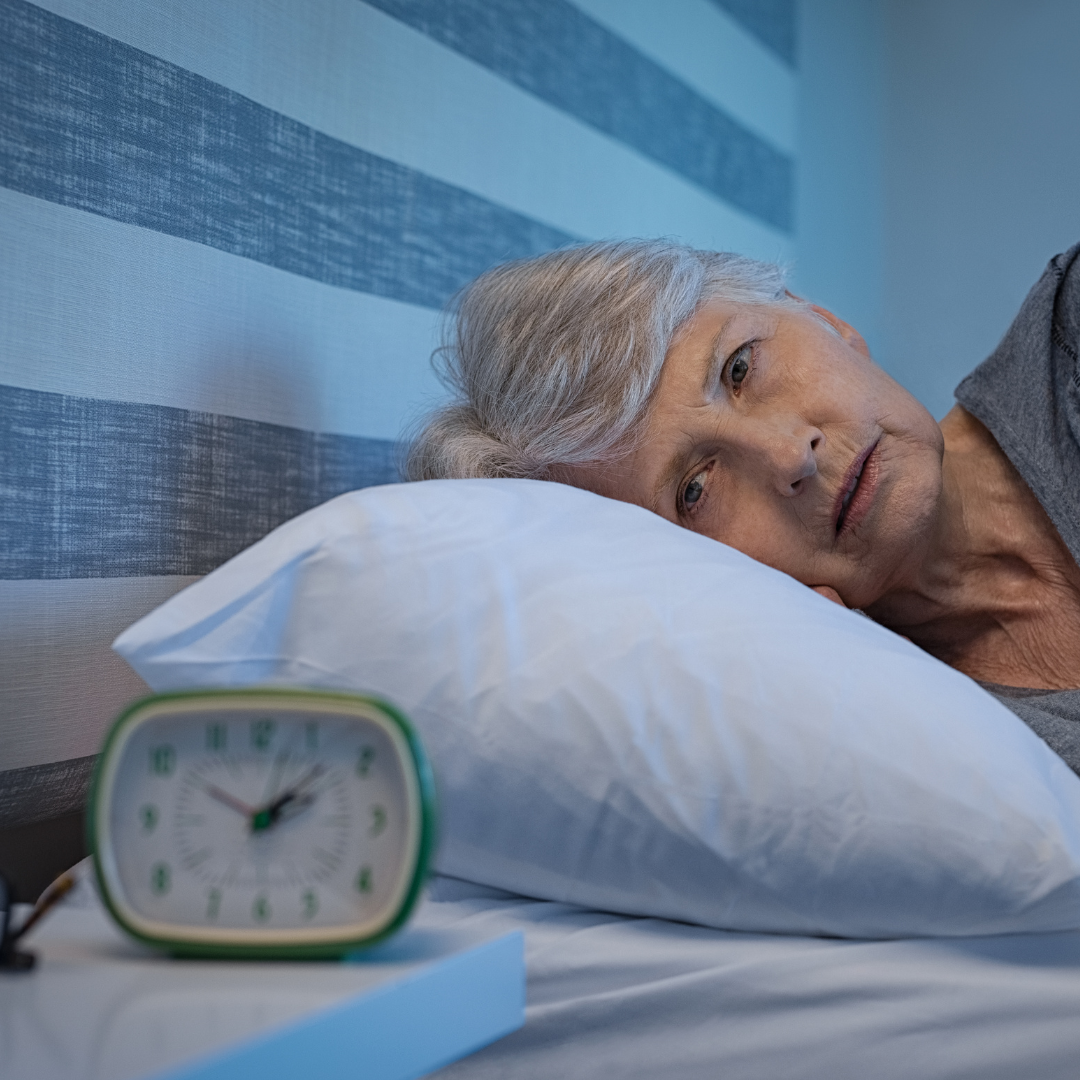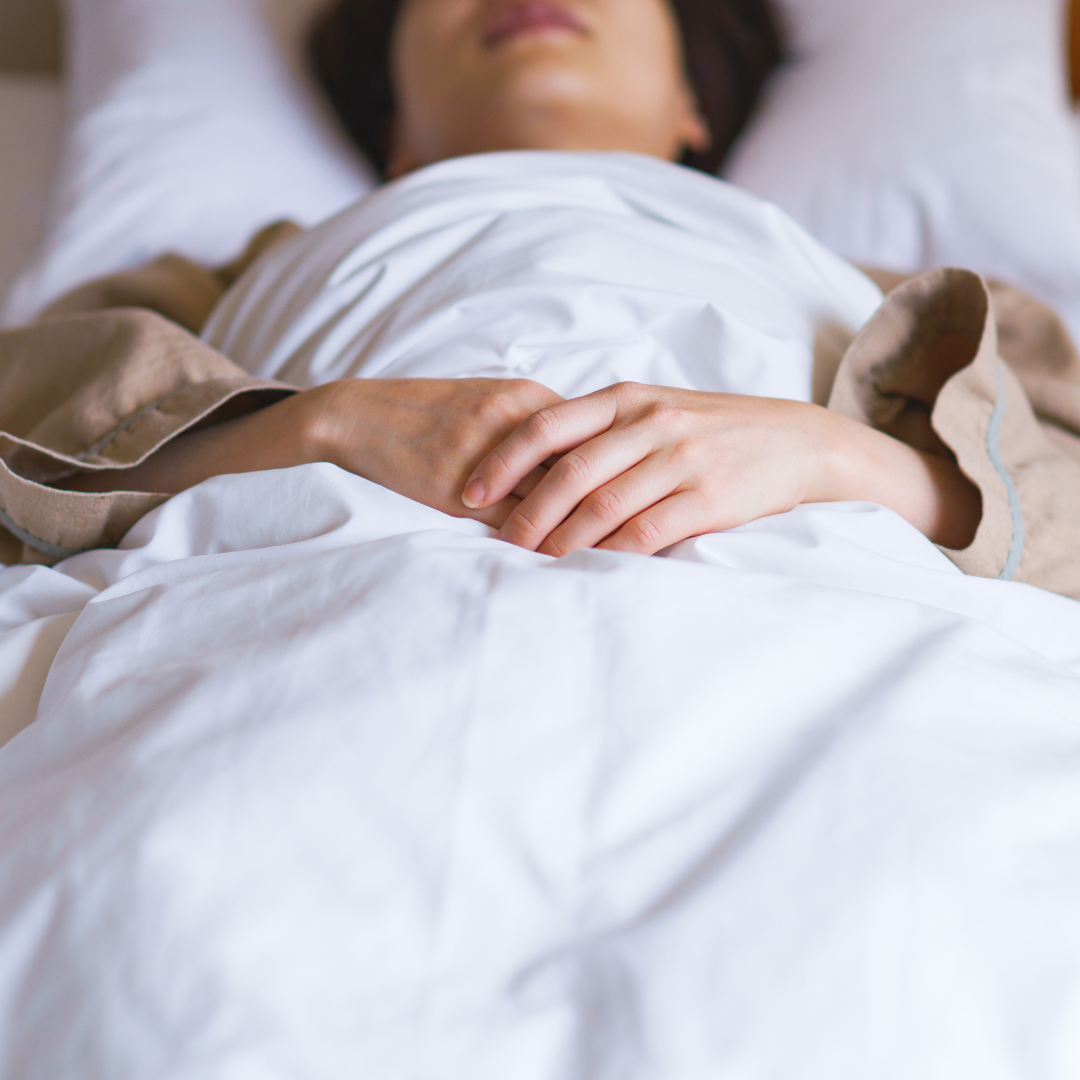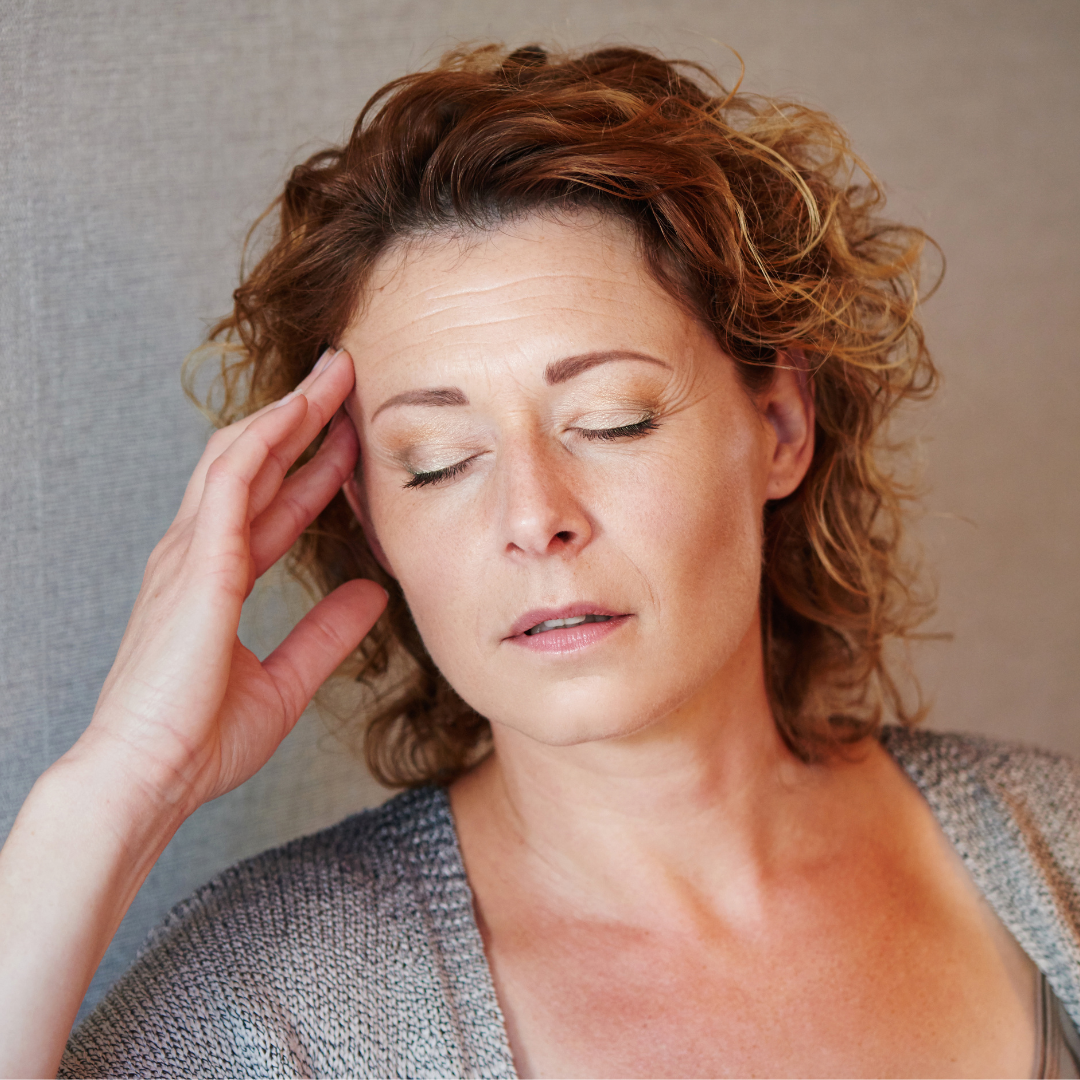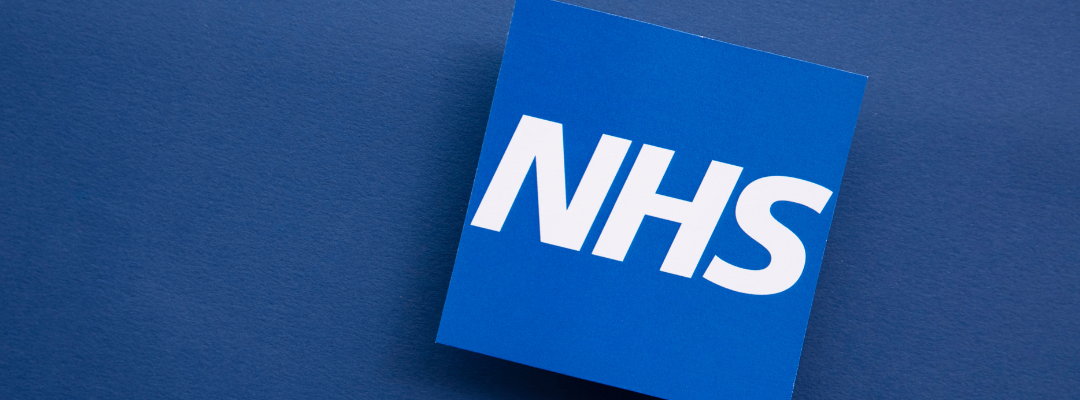
How to Beat Midlife Insomnia
Good sleep is important for health and well-being at any age, but many women in midlife can really struggle to achieve this. In fact, disrupted sleep is one of the biggest issues that troubles women in peri menopause and menopause transition, with studies indicating that 40-60% of women are affected.
Even for women who have always been good sleepers, peri menopause can literally signal the end of a good night’s sleep overnight. Frustratingly there’s no single cause, and identifying what factor or factors are affecting a woman can take time and patience to unpick. And, as with many things menopause, everyone is different.
Read on to find out why sleep disruption happens in midlife and, importantly, what can be done to help.
What causes sleep disruption in midlife?
Sleep disruption can broadly be categorised into three areas: biological, psychological and social stressors:
- From a biological perspective we know that hormonal fluctuations in peri menopause can affect sleep. Oestrogen receptors are located all over the body, including in sleep receptors in the brain, and when oestrogen declines it triggers unrest. Decline of progesterone is also a key factor as this hormone is particularly beneficial for sleep. Other symptoms of menopause can also disrupt sleep including night sweats, restless legs and itching (formication).
- Psychological factors include mood changes, increases in stress, anxiety and depression, a racing brain, and an inability to recall words and information, to name just a few. All of these can be distressing, not least when they seemingly come out of nowhere, and disrupt sleep.
- Social demands and stressors affect every woman in some way. From having babies later in life to caring for parents, to pressures of work and household chores, 21st century living means having to juggle much more than previous generations. Factor in disrupted sleep and the resulting exhaustion and fatigue during the day, a once rewarding and joyful life soon becomes distressing and a struggle.
With so much going on, and so many factors to consider, it’s no wonder many women are at their wits end. At the time in their life where stress is at it’s highest, their ability to cope is less. They can’t tolerate social demands and stressors. They can’t sleep and constantly worry. It’s a vicious circle that can be hard to break, but addressing sleep issues and understanding what causes them can improve things.
How much sleep does the body need?
When it comes to sleep, it’s quality not quantity that matters. While eight hours is often quoted as the optimum sleep requirement, there’s actually very little evidence to support this – other than it being a very rough average, and an easy number to report on.
In fact, it’s more important to focus on the quality of the sleep you’re getting rather than how many hours you actually sleep. A shorter amount of good quality sleep is far better for the body than a night-time of broken sleep. It’s also worth remembering there’s no one size fits all with sleep. So, whatever a fitness tracker might try to tell you your sleep goal should be, chances are it’s wrong.
Sleeping less is also a natural part of ageing. Much like the rest of our body, sleep centres in our brain also age and we need less sleep; we can’t turn back the clock.

Is it menopause, insomnia or something else?
Sleep disruption in menopause can sometimes simply be down to hormones or other symptoms that disrupt sleep. However, sleep disruption triggered by menopause can also develop into insomnia, and it’s important to speak with a doctor if disruption is persistent.
However, menopause and insomnia aren’t the only sleep disorders out there, and other conditions can be more common at the time of menopause, not just because of menopause. Snoring, for example, can be an indicator of obstructive sleep apnea. Nocturnal panic attacks can be mistaken for sleep apnea. Restless legs, and indeed arms may seem like insomnia. Whatever the underlying issue, it’s important to get the right diagnosis and the right treatment.
It’s also important to be aware that you can have more than one condition at the same time. So, getting the right diagnosis or diagnoses is very important to ensure treatments can be individualised. There’s no one size fits all.
What can help?
Knowing where to start with evidence-based treatments and therapies to improve sleep can be a minefield, but with an accurate diagnosis and a knowledgeable and suitably accredited clinical practitioner, it’s possible to improve sleep patterns.
- Hormone Replacement Therapy (HRT) can be an option for some women. It’s not a magic pill, but it may help with managing other menopause symptoms and in turn improve sleep to some extent. While oestrogen is beneficial with managing most menopause symptoms, it’s often progesterone, particularly body identical progesterone taken at night, that is the most helpful with sleep - though it doesn’t always work.
- Supplements such as melatonin and magnesium are often widely quoted as aids to sleep. While there is no evidence to support their effectiveness, they can be helpful for some people, though they’re not a panacea. They should be introduced in moderation but discontinued after three months if they don’t offer any benefit. If they don’t work in three months they’re not going to.
- Sleeping pills don’t generally fix underlying sleep issues. While they may help in the short term, they mask symptoms rather than address the root cause. Behavioural and psychological treatments such as mindfulness or Cognitive Behavioural Therapy (CBT) may be more effective.
- Cognitive Behavioural Therapy for Insomnia (CBTI) is a gold standard treatment for insomnia for most people. Its evidence based approach teaches tools to help with sleep in the long run. CBT for insomnia is very different to that used for anxiety, but has been proven to be very effective for women during menopause, even without HRT. It works on retraining the brain to sleep and can be used alongside other treatments and therapies.

Can a night-time routine help?
When it comes to getting a good night’s sleep, preparation is key, and a good wind down routine can really help quieten the mind and prepare the body for the rest it needs. Whether that’s turning down the lights, switching off devices, or simply letting go of the day, your body will thank you for a calm countdown to bed.
- Don’t go to bed too early so you can’t fall asleep. Wait until your tired. Get worries onto paper and a racing mind out. Worries onto paper. Leave them there. Worry time te unique – write it out – bit not at night. Easier to let go.tired but wired
- Think about your sleep environment – the type of bedding you use, fans if needed, cooling mattresses, lightweight layers and nightwear, the amount of caffeine you drink. Even small changes can make a big difference.
- Make time for mindfulness and meditation during the day and practice letting things go. The more you do it the stronger you get at letting things go, which can really help
- Be consistent with a waking up time and don’t lay in bed too long once awake. It’s important to be up and active for long enough to build up a ‘sleep drive ‘ during the day.
- Say no to napping during the day. Save the sleep for nighttime.
- Get light in the morning. Even on cloudy day, light exposure is incredibly beneficial to health and well-being.
- Be awake and active. Both physical and cognitive activity are beneficial for many things, including creating a sleep drive in the body. Sleep drive needs to be as high as possible to help with a good night’s sleep. Creates sleep drive.
In summary
Sleep disruption in midlife is very common. There are many reasons it can happen and many tools and techniques that can help. It’s important to seek help if you are experiencing problems and get the right diagnosis and treatment plan. Don’t struggle through sleep deprived days.
About Dr. Shelby Harris
Dr. Shelby Harris is a licensed clinical psychologist in private practice in White Plains, New York who specialises in Behavioural Sleep Medicine (BSM), working to improve the sleep of everyone from babies through older adults using evidence-based methods. She is also a specialist in Cognitive Behaviour Therapy (CBT) for anxiety and depression in adolescents and adults. Her unique expertise is frequently sought out by colleagues and well-respected medical institutions world-wide. She is one of the very few board-certified BSM specialists, with less than 160 clinicians worldwide who hold this distinction. She is frequently sought to train and supervise students in CBT for Insomnia, the gold-standard treatment for the disorder. Dr. Harris was formerly the director of the Behavioural Sleep Medicine Program at Montefiore Medical Center in New York City, and has helped countless people - of all ages - improve their sleep, anxiety, and mood.
Find Dr Shelby Harris on Instagram @sleepdocshelby
About Dr. Zoe Schaedel
Dr Zoe Schaedel is an experienced GP Partner and clinical leader with expertise in mental health and sleep difficulties. Through working in general practice and during her time as Managing Director for a mental health service in Brighton and Hove, Dr. Schaedel has developed an in-depth understanding of the damaging effect that poor sleep can have on physical and psychological health. Dr Schaedel has trained alongside some of the UK's foremost sleep clinicians and is a member of the British Sleep Society. She is also experienced in working with women in the menopausal transition and has been awarded the Advanced Certificate in Menopause Care by the Faculty of Sexual and Reproductive Health. Dr. Schaedel has undertaken additional training in CBT for Insomnia, Acceptance and Commitment Therapy and CBT for menopausal symptoms. She is a member of the British Menopause Society. Her advice has been published in many educational and commercial settings.
Find Dr Zoe Schaedel on Instagram @zoemenopausedr
www.harleystathome.com | Instagram @harleystreetathomemenopause
Facebook: Search Harley Street at Home: Diagnosis, Symptoms & Treatments or Harley St at Home: Lifestyle, Self-Care and Lifestyle to join our private community



